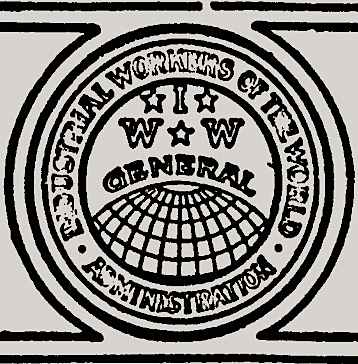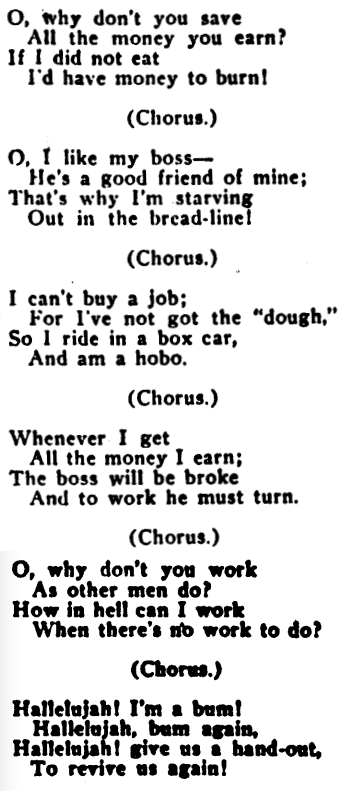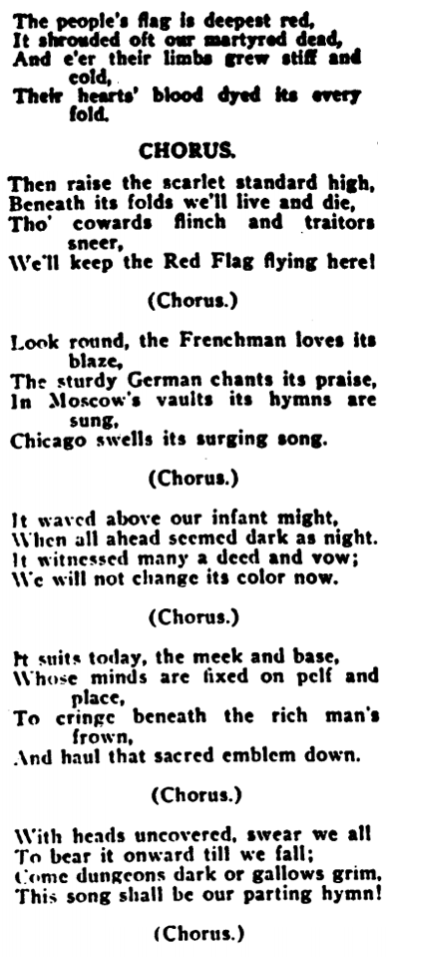Then raise the scarlet standard high,
Beneath its folds we’ll live and die,
Tho’ cowards flinch and traitors sneer,
We’ll keep the Red Flag flying here!
-Jim Connell
~~~~~~~~~~~~~~~~~~~~~~~~~~~~~~~~~~~~~~~~~~~~
Hellraisers Journal, Friday July 31, 1908
Fellow Worker James Wilson on the Songs of Social Revolution
From The Industrial Union Bulletin of July 25, 1908:
MUSIC
—–
One of the Most Powerful
of the Natural Forces.
[by James Wilson]

Among the physical forces, made useful to men, sound has played one of the most important parts. We use the word light, in a literal as well as figurative sense. But sound has more often a real, plain meaning.
Is not the ear the most perfect of the organs of sense? We can remember a tune, long after the words have been forgotten.
The association of sounds, and in a higher degree, music, is one of the most lasting and forcible of impressions.
What old cavalry veteran does not know that even the war horse remembers the different bugle calls, and will neigh and paw the ground with excitement when he hears the stirring blast of the trumpet?
We know that music stirs the emotions in every way. The majestic funeral march of Beethoven appeals to the mind with its solemn and awful grandeur; the latest rag-time dance tune fills us with the feeling of gaiety and enlivens our care-worn existence.
What more powerful to excite ridicule than a comic song? How very useful to bring out the hollowness of the sham religionists, with their sounding drum and doleful chants while they pick our pockets and tell us that “he that giveth to the poor, lendeth to the Lord!” The debt to be repaid in the next world-probably Mars-for that its the world nearest to the earth!
The sky-pilots have long told us of reviving grace-whatever that may be. They also tell us to “taste of the Lord and see that He is good.”
How comforting to a hungry man!
They have sung us this song, “Revive Us Again,” till we are anything but revived, rather are we more than ever exhausted, and our patience too! Here is the way this song or so-called hymn, is now sung to meet more fully the aspirations of the hungry worker for more dinner and less work:
* * * *
[Hallelujah! I’m a Bum]

* * * *
Ridicule and sarcasm are the only weapons to meet these people who long since refused to reason and whose only excuse for existence is to try to dull the sharp edge of the class struggle-the scavengers of the employing class! They would pray for our souls, while they prey on our miser
But while we hold up to scorn and derision the lackeys and camp-followers of the employers’ strong organization, let us not forget to shout defiance to the band of robbers, great and small, powerful and contemptible alike.
What is a “patriotic air,” of which we hear so much and which is so much reverenced? Generally a song of praise to the virtues, such as hatred, cruelty and avarice. The masters would persuade us that robbery is just, that cruelty is kind; and that hate is pure love, when done under the particular flag of a national band of robbers.
They send their spies, the missionaries, to teach the native of a conquered and bleeding province, the wickedness of idolatry.
They would teach our children at home to worship a piece of cloth consecrated by the stripes of negro slaves, and therefore a fit emblem to wave over the “bull-pen” of our own times.
But we Industrial Workers recognize but two nations-the nation of the slaves and the nation of the thieves!
We also have our flag-the Red Flag-of Brotherhood, the only one not stained by the tears of slaves, and fanned by the wails of the helpless conquered!
In time to come, as we are able to have the education of our children in our own hands, they will associate all noble aspirations around our truly holy emblem, and the songs of the Social Revolution will take the place of the savage war-songs of the masters drunk with cruelty and blood.
O, that some new Rouget de Lisle would write us a fitting song to express our hopes and rouse our often flaggering energies!
An old Russian exile, condemned to the lonely existence of a Siberian prison post, would often, when Spring called with the smell of flowers and all the varied voices of eternal Hope, listen eagerly for the song of the cuckoo in the neighboring forest.
Being isolated by many a weary mile from the nearest dwelling of men, it was not thought needful to confine the prisoners, as the vast wilderness took the place of walls and bars.
When the cuckoo sung, the prisoner knew that the weather would permit of travel, and for many years the exile would escape to the forest only to wander back to the hateful prison when Winter came.
At last, grown old and feeble, he feared to go at the call of “General Kukushka,” as the cuckoo was known by the prisoners of Siberia.
But the old association of the call of the cuckoo was not to be resisted.
The exile for Freedom’s cause, came one day to the Governor of the prison-camp , and said, “I am too old to go to General Kukushka for orders; I fear that I will perish in the wilderness; please lock me up, Your High Nobility, so that I can’t run away!”
The simple song of the cuckoo rang of Liberty to that man. He could not disobey the call.
Let us also have our song of Liberty and grim determination.
The battle is on. We often sing “The Red Flag,” written by James Connell, long prominent in the labor movement in England.
The old German tune of “Tannenbaum” fits the words to perfection.
Listen:
* * * *
[The Red Flag]

* * * *
May not this serve as our “Chant du Depart?”
In and through all the battle, and the daily toil; in spite of all the obstacles met and overthrown, painfully, one by one; in spite of the epithets hurled at us by the wise and good of the employers’ world; let us remember that music and harmony and the magic of sound can be made not only instructive but stimulating.
Here, then, is one of the “physical forces” hard to resist.
Let us use it!
JAMES WILSON,
Ind. Union No. 434,
Spokane, Wash.
———-
~~~~~~~~~~~~~~~~~~~~~~
SOURCE & IMAGES
The Industrial Union Bulletin
“Official Publication of the
Industrial Workers of the World”
(Chicago Illinois)
-July 25, 1908
https://www.marxists.org/history/usa/pubs/industrialworker/iub/v2n21-jul-25-1908-iub.pdf
See also:
Hellraisers Journal, Wednesday April 8, 1908
Spokane, Washington – Jawsmiths and Good Singers Enliven Street Meetings
Report from the IWW of Spokane by J. H. Walsh and a New Song, “Hallelujah I’m a Bum”
“Jim Connell and The Red Flag”
https://www.historyireland.com/20th-century-contemporary-history/jim-connell-and-the-red-flag/
Big Red Songbook: 250+ IWW Songs!
-ed by Archie Green, David Roediger,
–Franklin Rosemont, Salvatore Salerno
PM Press, Feb 19, 2016
(search separately: “hallelujah I’m a bum” & “red flag”)
https://books.google.com/books?id=QaXECwAAQBAJ
Note: “Hallelujah, I’m a Bum” listed as #12, first appearance in first edition of Little Red Songbook, ad for same in August 19, 1909 of Industrial Worker. “The Red Flag” listed as #1, first appearance in first edition of LRSB.
Rebel Voices,
An IWW Anthology
-ed by Joyce L. Kornbluh
PM Press, Sep 1, 2011
(search separately: “hallelujah I’m a bum” & “red flag”)
https://books.google.com/books?id=n2ATBwAAQBAJ
Claude Joseph Rouget de Lisle
https://en.wikipedia.org/wiki/Claude_Joseph_Rouget_de_Lisle
Chant du Départ
https://en.wikipedia.org/wiki/Chant_du_d%C3%A9part
Re: James Wilson
First Editor of “The Industrial Worker”
-March 18-Dec 25, 1909
http://depts.washington.edu/iww/Industrial_Worker.shtml
Arrested during Spokane Free Speech Fight
-Nov 2, 1909
https://cdnc.ucr.edu/cgi-bin/cdnc?a=d&d=LAH19091103.2.38
~~~~~~~~~~~~~~~~~~~~~~~~~~~~~~~~~~~~~~~~~~~~
